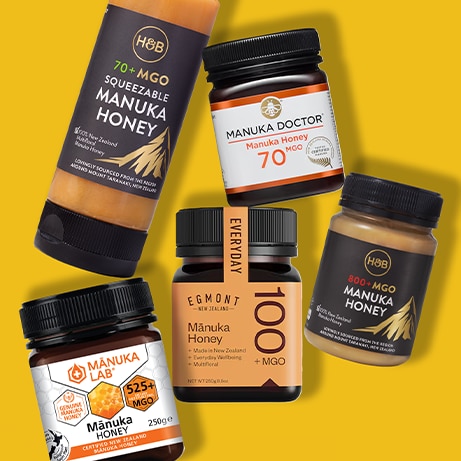15% off £25 or 20% off £35
Code:BASKET
What is curcumin?

Ever heard of curcumin? It's the pigment which gives turmeric its bright yellow colour. Learn more about the benefits of curcumin and what it's used for.
Summary
1What is curcumin good for?
Like other bright natural foods, curcumin is rich in phytochemicals and phytonutrients...
2Potential side effects of curcumin
Most people can take curcumin supplements without any problems. However, some people experience adverse side effects, including: Nausea, Diarrhoea...
3How to include more curcumin in your diet
Scientists have shown that cooking turmeric with oil encourages curcumin absorption.17 It’s easy enough to add a spoon of olive or coconut oil to a...
If you’re into health and wellness, you’ve probably heard about turmeric and why it’s good for you. But what about curcumin? Here, we’ll investigate exactly what it is, curcumins different health benefits and we’ll take a look at any potential side effects. We’ll explain how to get more in your life, including how curcumin supplements work.
What is curcumin?
Perhaps you don’t know curcumin by name. Still, you’d certainly recognise it on sight as curcumin is the pigment which gives turmeric its bright yellow colour.1 Curcumin is responsible for turmeric’s reputation as a healing food in Ayurveda, India’s ancient holistic tradition.2 Modern science has proven turmeric’s association with health and wellness is justified by demonstrating that curcumin’s anti-inflammatory effects.3
Handpicked content: What is turmeric?
How much curcumin is in turmeric?
However, turmeric itself is only 3% curcumin, which means it’s near impossible to get curcumin’s benefits by adding turmeric to meals.4 Many people choose instead to take curcumin as a supplement.
What is curcumin good for?
Like other bright natural foods, curcumin is rich in phytochemicals and phytonutrients.5
Various scientific studies have highlighted that curcumin may possess certain anti-inflammatory qualities, which may help to improve and manage some of the symptoms that come along with that are experienced with this biological response. 6,7
Oxidative stress, a natural process that has been found to be exacerbated by smoking and pollution (among other things), is strongly linked to ageing and age-related diseases.8 Not only does curcumin contain antioxidants which help fight oxidative stress8, but it scientific research shows that it may also help the body to promote antioxidant activity.9,10
Curcumin may also be able to help support your mood and reduce stress. In fact, one study from 2020 concluded that the participants who took curcumin supplements experienced an improvement in some aspects of mood and memory function.11 Another study found that when chronically stressed rats were given curcumin supplements, they did not experience a stress-induced decrease in their serotonin levels.12
Another potential benefit of curcumin is that it may support certain cognitive functions. One study from 2012 found that curcumin possessed the ability to encourage the growth and plasticity of genes in the brain.13
Looking for more details on how curcumin could be good for you? Our guide has you covered.
Potential side effects of curcumin
Most people can take curcumin supplements without any problems. However, some people may experience adverse side effects, including:14

- Nausea
- Diarrhoea
- Headache
- Yellow stool15
- Acid reflux
- Indigestion
People with liver complaints shouldn’t take curcumin without consulting their doctor, as curcumin increases bile secretion.16
How to include more curcumin in your diet
Scientists have shown that cooking turmeric with oil encourages curcumin absorption.17 It’s easy enough to add a spoon of olive or coconut oil to a curry, or rice dish, prepared with turmeric, and doing so helps the body better process curcumin.
Taking curcumin supplements
With so many different benefits of curcumin, taking curcumin tablets is a fantastic way to enjoy this pigments health benefits. Most supplements include black pepper, as the blood can’t effectively absorb curcumin without it. Black pepper increases the blood’s efficacy at absorbing curcumin by 3000%!18
How much curcumin per day?
So, how much curcumin can you take each day? The World Health Organisation (WHO) state that 1.4mg per pound of body weight is acceptable to take per day.19
The final say
That’s the lowdown on all things curcumin. Now you know more about this interesting component of turmeric, will you add it to your diet? Keep in mind that it may interfere with some medication and pre-existing conditions, so please speak to your GP before trying it.
Last updated: 9 September 2022
The advice in this article is for information only and should not replace medical care. Please check with your GP or healthcare professional before trying any supplements, treatments or remedies. Food supplements must not be used as a substitute for a varied and balanced diet and a healthy lifestyle.
- https://lpi.oregonstate.edu/mic/dietary-factors/phytochemicals/curcumin
- https://www.ncbi.nlm.nih.gov/books/NBK92752/
- https://www.ncbi.nlm.nih.gov/pmc/articles/PMC3633300/
- https://pubmed.ncbi.nlm.nih.gov/17044766/
- https://www.health.harvard.edu/staying-healthy/add-color-to-your-diet-for-good-nutrition
- https://www.ncbi.nlm.nih.gov/pmc/articles/PMC8572027/
- https://www.ncbi.nlm.nih.gov/pmc/articles/PMC5664031/
- https://pubmed.ncbi.nlm.nih.gov/10964379/
- https://onlinelibrary.wiley.com/doi/abs/10.1002/jat.1517
- https://www.ncbi.nlm.nih.gov/pmc/articles/PMC5664031/
- https://www.ncbi.nlm.nih.gov/pmc/articles/PMC7352411/
- https://pubmed.ncbi.nlm.nih.gov/17617388/
- https://www.ncbi.nlm.nih.gov/pmc/articles/PMC3281036/
- https://www.sps.nhs.uk/articles/advising-patients-using-turmeric-on-its-adverse-effects/
- https://www.ncbi.nlm.nih.gov/pmc/articles/PMC6835707/
- https://www.sps.nhs.uk/articles/turmeric-potential-adverse-effects-and-interactions/
- https://www.bbc.co.uk/news/magazine-37408293
- https://pubmed.ncbi.nlm.nih.gov/9619120/
- https://www.ncbi.nlm.nih.gov/pubmed/28417091













